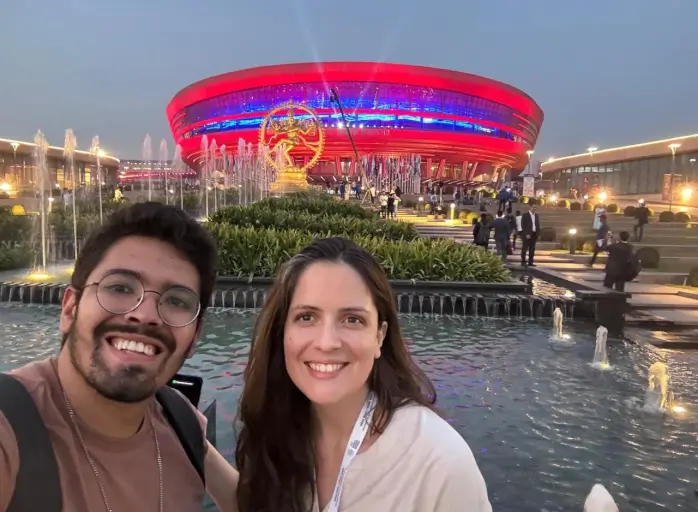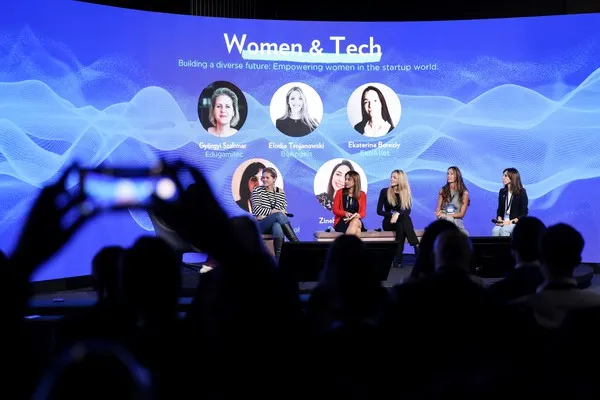

Entrepreneurship, technology and leadership through a gendered lens
As part of the Luxembourg Venture Days, a Women & Tech panel brought together 5 leading women in the startup world to explore aspects of entrepreneurship.
 Luxinnovation
Luxinnovation
As part of the Luxembourg Venture Days, a Women and Tech panel on 18 October brought together five leading women in the startup world to explore various aspects of entrepreneurship and tech ecosystems, and the requirements for a more diverse future. Panellists brought forward key ideas and solutions to enhance female representation across board.
Entrepreneurs, whether male and female, face a number of challenges as they navigate the business landscape. To empower startup founders and connect investors, Luxembourg Venture Days, was launched as a flagship event for all startup stakeholders and enthusiasts.
It was co-organised by Luxinnovation, the Luxembourg Private Equity and VC association (LPEA), the Luxembourg Startups Association (Startups.lu) and the Luxembourg Business Angel Network (LBAN), with support from the House of Startups, Girls in Tech, the Luxembourg Open Innovation Club (LOIC), Women in Digital Empowerment (WIDE), Tomorrow Street, and covered a wide range of activities to empower startup founders and connect investors.
The Women and Tech Panel during the three-day event, was an excellent avenue to explore the nuances of the entrepreneurial journey, shedding light not just on the general issues that all entrepreneurs face, but also on the specific views of women entrepreneurs in the ecosystem.
Being a female entrepreneur, you have to work twice as hard and you might fail many times, but if you believe in your heart that you have a key for change, then you’re going to keep going.
Comprised of female founders and leaders from various industries, the all-female panel did not hold back in sharing key milestones, personal struggles, professional challenges, funding barriers, and various support measures needed to improve the representation of women on a local and global scale, as well as the experience of all entrepreneurs.
Female representation in technology and leadership positions
 Patricia Souza, Co-managing Director of the Girls in Tech Luxembourg chapter, which was founded in 2022 but is part of the larger US organisation founded in 2007, emphasised the need for better representation of women not only in tech and leadership positions, but also in the VC world as investors and funding recipients.
Patricia Souza, Co-managing Director of the Girls in Tech Luxembourg chapter, which was founded in 2022 but is part of the larger US organisation founded in 2007, emphasised the need for better representation of women not only in tech and leadership positions, but also in the VC world as investors and funding recipients.
Citing the most recent World Economic Forum Global Gender Gap report released in June 2023, she noted that women made up 29.2% of STEM (science, technology, engineering, and mathematics) professionals and 24% in Luxembourg. “While the percentage of women in the tech careers is low, the numbers of graduating students and women are increasing. However, the retention of those women in their first year of work is very low,” she noted.
Likewise, she emphasised the low numbers of women in top positions such as vice president and C-suite level and questioned why women entrepreneurs are underfunded, given that they account for only around 2% of invested capital in the US market according to the Pitchbook data for 2022.
We can’t change everything overnight, but we can get started today.
“Fundraising I think is even less in Luxembourg. We have to do better. We pride ourselves in having the lowest [gender] pay gap in Europe so why do we have this funding gap? We can’t change everything overnight, but we can get started today,” underscored Marina Andrieu, Executive Director and co-founder of Women in Digital Empowerment (WIDE).
Isabel Holguera Vera, Advisor – Start-up Acceleration at Luxinnovation, explained that a recent internal survey, conducted with the support of stakeholders in the startup ecosystem, showed that “Luxembourg has only 6% of female founders or co-founders among the approximately 550 startups identified in the country”
Ms Souza identified three major reasons for this disparity: stereotypes and biases that women don’t belong in tech careers, the lack of female role models, and unconscious biases in the hiring, promotions and payments decisions.
Measures required to change the status-quo
Based on the theme of the event, “Building a diverse future: Empowering women in the startup world”, the speakers shared insights on how to change the norms. Ms Souza gave five calls to action:
- Educate girls and young women to go into the tech,
- Expose girls and women to role models
- Challenge the stereotypes and biases
- Invest in programmes, initiatives and organisations that are changing the landscape
- Encourage more women to start and invest in VC funds.
“The change starts within us. By working together, we can create an inclusive and diverse tech industry where everyone has the opportunity to succeed,” she stressed.
In response to the low numbers from the surveys, Co-Founder and Director of the Luxembourg Tech School Anush Manukyan emphasised the importance of trainings on entrepreneurship and technology from a young age. Elodie Trojanowski, CEO of HumanTech Partners and Chapter Lead of Be Angels Luxembourg, noted the need for confidence in entrepreneurship, emphasising that trust in one’s project can also unlock opportunities even when confidence is low. Co-Founder and Chief Knowledge Officer of Dealfox Zineb Bensaid advocated for “he for she” initiatives, promoting collaboration between men and women. “I work a lot with people regardless of gender. It’s about how you interact. You need confidence in some sectors, particularly in tech, it’s important to have this awareness and develop it,” she stated.
We can create an inclusive and diverse tech industry where everyone has the opportunity to succeed.
Co-Founder and CEO of Edugamitec Gira Szakmar encouraged women to be bolder in applying for roles, even when they don’t necessarily fulfil all the criteria, mirroring the confidence that men often exhibit. Ekaterina Bereziy, the Co-founder and CEO of ExoAtlet, the company behind recovery devices such as wearable exoskeletons for children and adults, stressed that the focus should neither be on male or female but on individuals building their lives. She highlighted that as an employee, one equally has the power to change the world.
Education and awareness are essential
 Sergio Coronado developed Luxembourg Tech School to promote technology an early age. Since its inception in 2016, over 1000 students have graduated, gone on to pursue professions in technology, and founded their own businesses. “It is more than just a coding school because students also learn project management, teamwork, and entrepreneurship. They develop ideas on paper into a functional prototype in a short amount of time. It’s amazing to watch how they start with little knowledge of technology and by the end of the year, they can build such projects and prototypes. We always have a lot of girls in our classes, and those who enrol usually stay. They’re not afraid of the challenge, they’re eager to learn and come up with projects, and are great leaders throughout the year,” explained the co-founder Anush Manukyan.
Sergio Coronado developed Luxembourg Tech School to promote technology an early age. Since its inception in 2016, over 1000 students have graduated, gone on to pursue professions in technology, and founded their own businesses. “It is more than just a coding school because students also learn project management, teamwork, and entrepreneurship. They develop ideas on paper into a functional prototype in a short amount of time. It’s amazing to watch how they start with little knowledge of technology and by the end of the year, they can build such projects and prototypes. We always have a lot of girls in our classes, and those who enrol usually stay. They’re not afraid of the challenge, they’re eager to learn and come up with projects, and are great leaders throughout the year,” explained the co-founder Anush Manukyan.
WIDE aims to close the gap gender in the field of ICT in Luxembourg and empower more women to seize related opportunities.
We need to educate on what it takes to build a product, bringing it to the market, determining the cost and gaining clients.
Marina Andrieu stated that “girls nowadays need to know that being an engineer, IT specialist or entrepreneur is not an option.” According to her, this makes it important for organisations to work on a pipeline of concrete actions. “We need to educate on what it takes to build a product, bringing it to the market, determining the cost and gaining clients. I think we can do better, and we have to do better. We need to see a more systemic change.”
The non-profit organisation founded in 2014 has “ongoing collaborations with the ecosystem and long-term partnership with the Luxembourgish state, with many programmes and resources available for any woman interested in launching a startup,” she added.
Navigating challenges as entrepreneurs
Reflecting on her path as a female entrepreneur, Gira Szakmar spoke on some market challenges she faced as and her perspective on failure. She noted that challenges could cause a founder’s dream to evolve, but this redirection or “failure” only leads to a different path.
Her initial product, a game-based learning solution for children, transitioned into a corporate and adult training initiative due to funding constraints. However, she believes that the solution will find its way back to children “because learning by playing is something we always do,” she mentioned.
The company is currently working on an EU project to help people learn about disaster resilience, and it has partners in African countries where they educate on financial literacy and sustainable income generation methods for households.
“Being a female entrepreneur, you have to work twice as hard and you might fail many times, but if you believe in your heart that you have a key for change, then you’re going to keep going, keep fighting and stand up every time that you are kicked down,” she pointed out.
The main challenge when you are a mum and entrepreneur is to organise your time.
 Zineb Bensaid discussed the intricacies of balancing motherhood with entrepreneurship. “I think the main challenge when you are a mum and entrepreneur is to organise your time. Once your day is carefully planned, you try to find a good balance between your professional and private life. As an entrepreneur you find a certain flexibility which a typical employee cannot have. So you have this advantage,” she stated, noting the necessity to delegate as needed.
Zineb Bensaid discussed the intricacies of balancing motherhood with entrepreneurship. “I think the main challenge when you are a mum and entrepreneur is to organise your time. Once your day is carefully planned, you try to find a good balance between your professional and private life. As an entrepreneur you find a certain flexibility which a typical employee cannot have. So you have this advantage,” she stated, noting the necessity to delegate as needed.
Élodie Trojanowski, whose former consulting and IT company Luxfactory was recently acquired by Duterrag Investissements, underscored the importance of entrepreneurs comprehending and navigating the risks associated with business growth. “Sometimes your startup is growing very fast. It is important to take a step back and try to see the full picture and put some good practice within the company.”
Passionate about the real economy, her motivation to be part of Be Angels, a network committed to connecting entrepreneurs and investors, emanated from its well-structured approach and impact.
Photo credit: Sophie Margue/Luxinnovation


